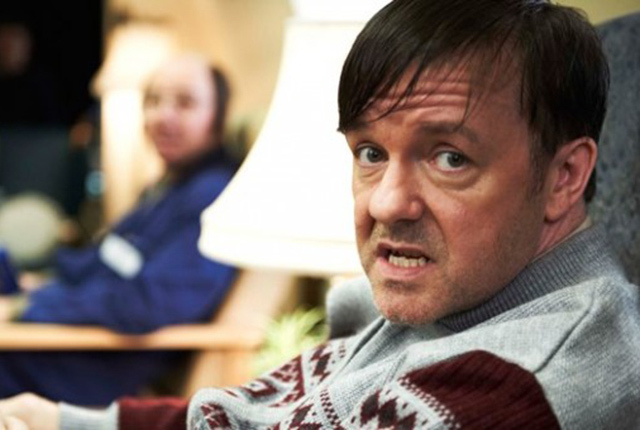 Watching separate new comedies from Ricky Gervais and Stephen Merchant this month is like trying to adjust to solo projects from Laurel and Hardy. How could they exist on their own?
Watching separate new comedies from Ricky Gervais and Stephen Merchant this month is like trying to adjust to solo projects from Laurel and Hardy. How could they exist on their own?
After collaborating on “The Office,” “Extras,” “Life’s too Short” and “The Ricky Gervais Show,” the Mutt and Jeff of British comedy are going it apart for two quite separate ventures.
Merchant’s vehicle, “Hello Ladies,” which starts on HBO Sept. 29, about the dating problems of a too-tall brit in modern L.A. is familiar territory — cringe comedy about someone who fails so brilliantly; disaster goes with comedy quite easily, but there’s an undercurrent of sadness about it as well.
A number of scenes are terrifically conceived, such as the opening one in which Merchant and his pudgy friend Wade (Nate Torrence) trying to introduce themselves to a couple of unsuspecting women at a bar. But as Merchant pushes buttons on the show, ditching unpopular friends to desperately try to advance his popularity, there is that undercurrent of meanness that can turn one away from a lead character.
There is also that now common vehicle in Gervais-Merchant sitcoms, the physically challenged character, though Kives (Kevin Weisman of “Alias”) ends up getting all the girls here.
Collaborating with U.S. sitcom makers seems to have created that obvious character: the obvious match right under his nose in Christine Woods, who is actually quite funny as Jessica, kind of a loser in romance as well.
Challenging audiences with difficult lead characters have been a hallmark of Gervais and Merchant, from David Brent in “The Office” to Andy Millman in “Extras.” The two of them, playing themselves, weren’t so nice to Warwick Davis on “Life’s Too Short” either.
And while Merchant’s lonely Stuart has a similar personality; Gervais’ “Derek,” which premiered on Netflix this week, goes a different direction: Playing a rather damaged worker in a nursing home with greasy hair, off putting habits, a strange gait, and even worse friends.
Just as characters in the show do, viewers may recoil at his very image at first only to warm to him quickly for his innocence and ultimate kindness. The triumph of “Derek,” which I watched in a full seven-episode gulp, is that it is set at a place that is almost always ignored by television (though a television almost always blares in such places), the elder care home, where modern people put their older relatives in to forget.
It’s been the setting of some episodes of comedies, but not often the central location. With some piano music and pop ballads playing in the background, it touches at emotion but never gets overly maudlin (especially for a setting where characters are likely to die ever other episode).
It’s always a risk to play a mentally challenged person, but Gervais does it with some insight and kindness, not afraid to infuse his character with some humor but ultimately making him a fuller character — especially compared to his mates, one of whom is a (literal) wanker who has found a place to hang out during the day, the other the cranky resident fix-it man with a terrible haircut.
In the latter role, Karl Pilkington gives lie once and for all to the character he played for years on the popular podcast and animated version of it and a round-the-world series that played a couple seasons on Discovery. Rather than being the honest real life dolt Gervais insisted he was, he is instead a somewhat skilled comic actor after all.
The heart of the show, other than Gervais’ “Flowers for Algernon” character, is the main caregiver at the facility, Hannah, played with considerable subtlety by the comedienne Kerry Godliman. Almost immediately, she’s set up with the grandson of a new resident, fights for residents against greedy relatives, and remains a loyal friend and protector of Derek.
Laughs and tears come with almost every episode, but without the excesses that one might expect from such a show. There is dignity and triumph and a pretty good pop soundtrack as well.
For Gervais, it’s almost a complete turnaround from his earlier grating characters and more like the final episode turnaround that Andy Millman got in “Extras,” realizing the value of kindness above all things.
It’s an experiment that works, and makes the move to Netflix all the more worthwhile, where I’d put it as second only to “House of Cards” among their impressive original roster.
And if that leaves Merchant’s solo effort a bit in the background for now, we can only hope for some reunited Laurel and Hardy collaborations in the future.